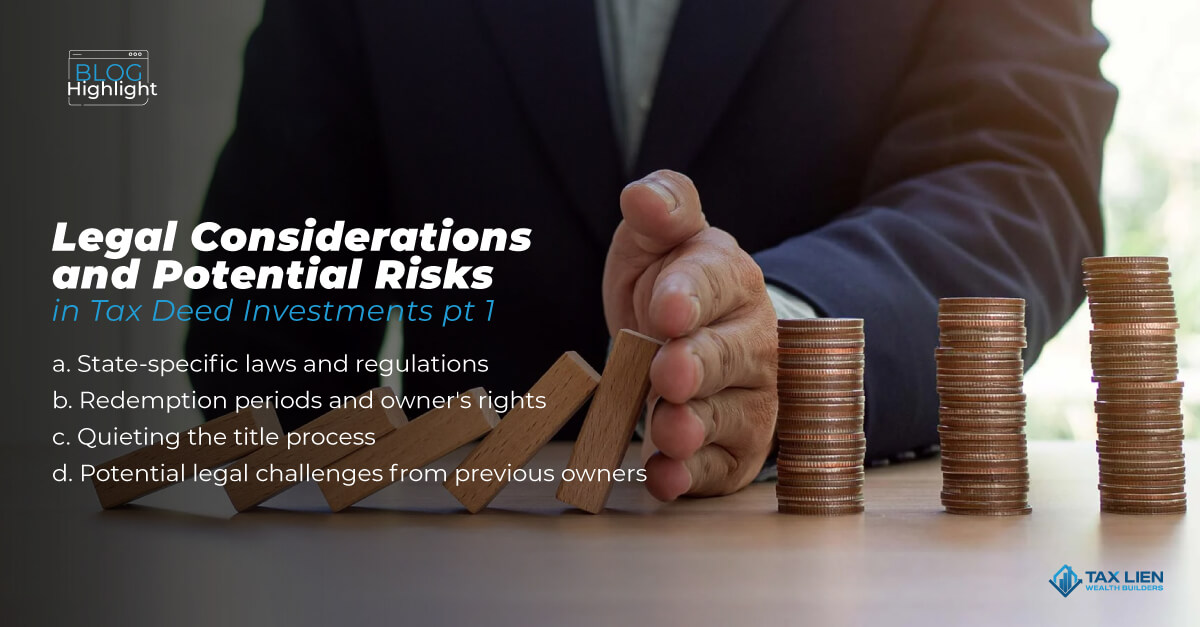Legal Considerations and Potential Risks in Tax Deed Investing Part 1
The advantage that tax-deed investments have over other forms of traditional investments is no longer news to you as an investor.
However, approaching this terrain with your eyes open and knowledge intact cannot be overemphasized.
Getting a property at a fraction of its market value is great but have you considered the legal and other potential risks attached to this property?
In this post, we will delve into the legal considerations and potential risks that come with tax deed investments.
Legal Factors to Consider in Tax Deed Investing
State-specific laws and regulations
One of the first things to understand about tax deed investing is that laws and regulations vary significantly from state to state so it is essential to get familiar with the specific rules governing the state you are investing in.
What works in one state might not apply in another.
Knowing your state’s specific laws can save you a lot of headaches. Imagine buying a property at a tax deed auction, only to find out later that the previous owner has a long redemption period or that there are additional legal hoops to jump through.
In order to avoid these pitfalls, it is important to research and understand the rules in the state where you plan to invest.
In some states, the tax deed sale process is relatively straightforward, but in other states, the process can be more complicated due to additional regulations and longer redemption periods. It is imperative to understand the peculiarities of your state before delving into investing.
Redemption periods and owner’s rights
The redemption period attached to a property is another factor to consider when investing in a tax-deed property. After a tax deed sale, some states allow the previous owner a period to reclaim their property by paying the owed taxes plus interest.
This period can range from a few months to several years.
Having a clear understanding of how long the redemption period is can help you make an informed decision on whether or not to proceed with such an investment.
Quieting the title process
In tax deed investing, quieting the title is a legal process that is used to establish a clear and marketable title to a property.
When you purchase a property through a tax deed sale, the title to that property may not be fully “clean” because there could be unresolved claims or interests from previous owners, lienholders, or other parties.
Acquiring a property via a tax deed sale is usually not the end, you might need to “quiet the title.” Without this action, selling the property or getting title insurance may become difficult. It protects your investment by ensuring that no one can later claim ownership or challenge your right to the property.
This process can be time-consuming and expensive, requiring a deep understanding of local laws and procedures. But it is necessary to confirm your ownership and eliminate any remaining claims against the property.
Potential legal challenges from previous owners
Even after purchasing a tax deed and quieting the title, there are still other legal challenges to look out for before investing in a property. This includes disputes over the sale process, claims of improper notice or other legal issues.
These legal challenges can be costly and time-consuming. It is important to be prepared for them and have a legal strategy in place.
It will help a great deal if you consult with a real estate attorney who specializes in tax deed sales. That way, you get the help you need to navigate these challenges more effectively.
Investing in tax deeds can be a game changer, but it is not without its legal complexities and risks.
By understanding state-specific laws, redemption periods, the quieting title process, and potential legal challenges, you are better informed to navigate the landscape and protect your investments.







